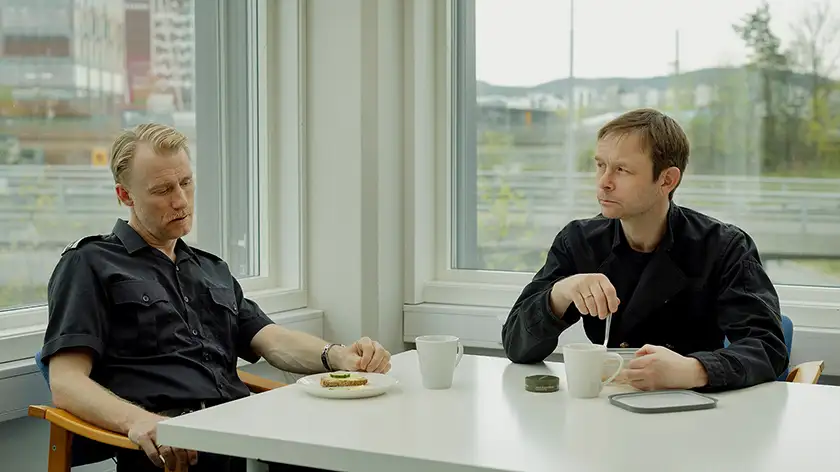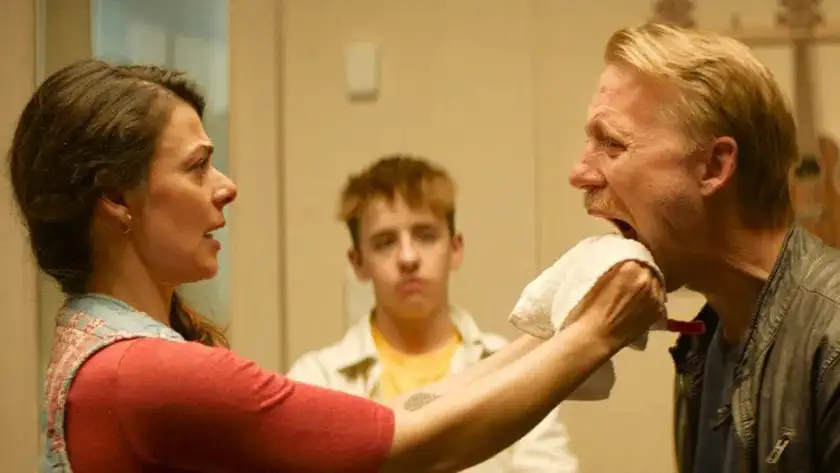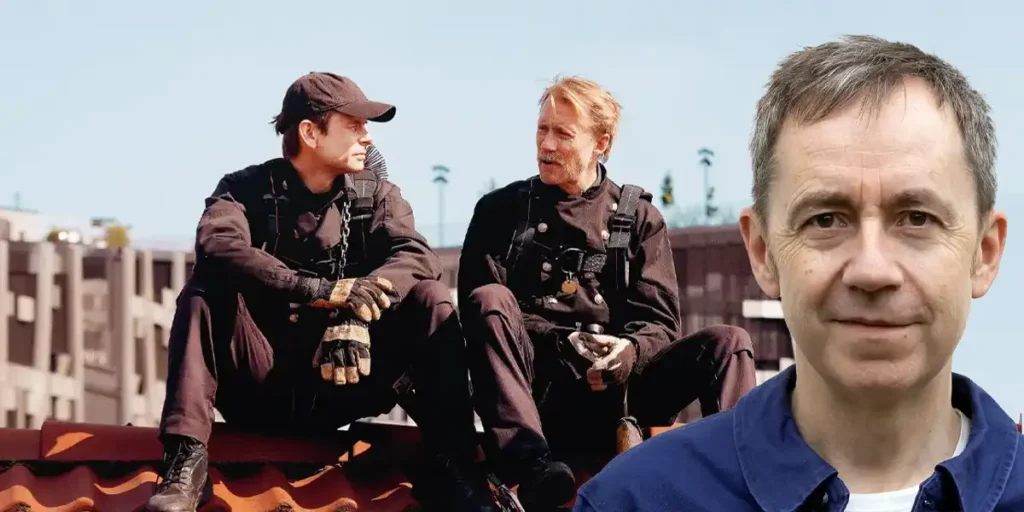At the BFI London Film Festival, we interview Dag Johan Haugerud, writer-director of Sex, about the film’s themes, male friendships, the “Sex, Dreams, Love” trilogy, and more.
Sex, the first film in a trilogy by writer-director Dag Johan Haugerud, begins with a simple conversation between two nameless friends that sets the tone for the rest of the movie. One of them, Thorbjørn Harr’s “Supervisor,” can’t stop thinking about a recurrent dream where someone – he thinks he was David Bowie, though it could also have been God, or someone from ABBA – looks at him “as if [he were] a woman”. The other, Jan Gunnar Røise’s “Chimney Sweeper,” who’s not only straight but in a happy relationship with his wife, has just had “sensational” sex with a man. There were no feelings attached to it, so he doesn’t consider that cheating, but his wife (Siri Forberg) disagrees.
As the film unfolds, we watch our three characters ask questions and change as they learn more about who they are, in a movie that tackles anything from love, sex, and relationships to gender and sexual identity, and does it with both humor and heart.
At the BFI London Film Festival, we speak with Dag Johan Haugerud about the film’s themes and different audiences’ reactions to them, the friendship at its core, having chimney sweepers as protagonists, the “Sex, Dreams, Love” trilogy, and more. Read the interview below!
Sex Explores Sexual Identity, Sexuality, Gender, and Owning Our Story
Thank you for making this beautiful film! I think that, based on the title and synopsis, some audiences might have an idea of what they’re in for and they’ll be so surprised to find a completely different kind of movie! I love that there are so many themes and messages in it. What is Sex mainly about, to you?
Dag Johan Haugerud: Different things. It’s about the difference between sexuality and sexual identity, if there is a difference, and how that comes across in ourselves. You could also say it’s about what infidelity is, and I also think it’s about owning your own story, in a way, what happens when others take ownership of it.
I love that you explored this idea of ownership in the film. There’s a moment where one of the chimney sweepers asks his wife why she feels the need to “own” a facial expression he makes when they’re intimate. It made me think so much. Why is sex so important? Why does it have all this power?
D.J.H.: It is important. It has a lot of power. And you also shouldn’t underestimate the power that lies in a person looking at you and saying that they want you. That’s quite a big thing to experience. And of course, why do relationships depend on sexuality so so much?

The film is also about gender, of course, right from the opening scene where one of the chimney sweepers is telling the other about a dream he had. Where did the idea to have David Bowie be part of that dream come from?
D.J.H.: David Bowie is a symbol transgression, but a tender one, in a way, because he played with female role models, female clothing and and so on. So I think he was the obvious choice for a person to have a dream about when the dream is about being seen as as a woman. But he isn’t sure, though, if it’s David Bowie, or if it’s God, or if it’s Anni-Frid Lyngstad from ABBA, which makes it even more gender breaking, in a way.
It’s so interesting that you bring religion into it too, by mentioning God.
D.J.H.: Yes, because he’s experienced this dream, you know? Somebody has seen him in a way that he thought he wasn’t; had almost like this… Not a vision, but the idea that someone is looking at him and he finds that he is expanding, and maybe only God can look at you that way, or maybe David Bowie, or maybe Anni-Frid Lyngstad from ABBA! [laughs] ABBA is obviously a gay reference, and David Bowie is a transgressive gender reference. And God is, you know, to say just how powerful [that experience] is.
Healthy Masculinity: Dag Johan Haugerud on the Central Friendship in Sex
I think your film is so important because it shows a friendship between men where they actually communicate with each other and talk about their feelings and experiences. It’s so rare to see this kind of dynamics on screen.
Dag Johan Haugerud: It’s sad, isn’t it? It should be normal [to see friendships between men who talk with each other].
We so desperately need to see examples of healthy masculinity in cinema. How did you go about crafting this central friendship?
D.J.H.: I had these actors in mind when I wrote it; I knew I wanted to work with them, so I had asked them if they were interested in doing a movie with each other and with me writing characters for them. So they were really the starting point, and I wanted to challenge them, in a way – to make them play someone or act in a way that they hadn’t done before. I also made two movies in the past with all female characters talking a lot about their life, and I would often get asked if it would be possible for men to talk like that. I’ve always thought that yes, of course, that would be possible. Just give them something to talk about! [laughs] I have both gay and heterosexual friends that I can have these conversations with, so to me, it’s not so unusual.
Dag Johan Haugerud on Different Audiences’ Reactions to Sex and the Different Generations in the Film
I loved the humor in the film. You have a way of using humor to really make us think about our own preconceptions – for example, our insistence on having to label everything or our own attitudes toward sex, gender, and relationships. It feels like the humor is there, but in a subtle way that has a purpose. How did you manage to find this balance?
Dag Johan Haugerud: Thank you. I didn’t think so much about it. I think that humor is a big part of how we express ourselves; even right now, there is some humor in our conversation as well. So it’s there all the time; I didn’t mean it to be satirical or to be like a comedy. I’m very happy to hear that people are laughing when they watch it. I think that’s a good thing, but it kind of surprised me as well.

What does it feel like to bring the film to the UK?
D.J.H.: It’s very exciting. I find that audiences are different in different countries, so I’m very curious [to find out] what the reaction will be here. At the Berlinale, I was really surprised how funny the audience found it. Then I showed it at a festival in Italy, and they found it more controversial.
Really? In what way?
D.J.H.: There’s a scene where one of the chimney sweepers has a conversation with his son [played by Theo Dahl], who tells him that a girl in his class is having a really heavy period. I was talking with an Italian journalist who thought it was kind of controversial.
As an Italian, I guess I can see why they thought so: we are so behind in so many ways, as a country, and even periods are still a taboo in our society. I thought all the scenes between Thorbjørn Harr’s character and his teenage son were so sweet and poignant! There’s this amazing parallel that you’ve created between them, as they kind of grow together.
D.J.H.: Yeah, I think the son represents the younger generation, who may not be so conventional regarding their own gender, or the ideal of what they should be like as a man. At his age, I feel that he might be more liberated in a way: more open to society and more open to changes – and also more open to his father’s changes. He sees that his father is changing, and it’s so obvious to him that he’s experiencing something. But in other things, he struggles as well – having to think about his future at a really young age. Children grow up much faster nowadays, and yet at the same time they want to be children for longer. So it’s kind of a paradox.
How did you cast Theo Dahl, who plays the character of the son?
D.J.H.: I didn’t write [the role] for him because I didn’t know any actors that age. We did auditions and I chose him because [the dialogue] didn’t sound strange: he found it quite natural, and he had been thinking about the same things himself. So the character was like him, in a way.
Shooting and Scoring The Film, and Having Chimney Sweepers as Protagonists
Was it a challenge to shoot most of the scenes indoors?
Dag Johan Haugerud: It was a challenge. My cinematographer [Cecilie Semec] and I asked each other, “How can we shoot really long dialogue scenes about intimate things?” Because when you’re talking very intimately, you cannot walk around. You can’t just go into another room and get some coffee, you know? It’s not natural. It’s so tender in a way, that you have to sit and listen. So that was a challenge: we had to test different lenses and positions for the camera.
The framing is so beautiful!
D.J.H.: …Because we worked on it A LOT! [laughs]
I was also very impressed by the score. I wasn’t expecting it to be so loud, but it really worked for me.
D.J.H.: It’s supposed to be… big and beautiful! [laughs] I’ve known the composer [Peder Kjellsby] for many years: He’s a jazz drummer originally, but he makes film soundtracks too, and he has scoredfor all of my movies. We were having this conversation about what the music should feel like for this part of Oslo, or how we feel when we are driving through these major roads into the city: what kind of music goes on inside our head? We were also quite fond of the music used in Taxi Driver, and I really like wind instruments and percussions; Peder Kjellsby] knows, so he always uses these instruments. When he came up with this, I immediately recognized it as the exact sound I’d have in my mind when driving into the city.
Out of all the professions in the world, why did you pick chimney sweepers for your protagonists? As I was watching the film, I had forgotten that chimney sweepers were even still around to this day!
D.J.H.: Oh, but they are! In Italy there’s a chimney sweeper festival every year, where people from all over Europe gather in this small town and parade through the city! [smiles] But to answer your question, I’ve been making movies about teachers and health workers. It doesn’t matter what the characters do, but I really wanted to make a movie about people working in a field that I didn’t know anything about myself. I just made a list of professions – and this was during covid, so I had quite a lot of time – and then I called them, asked them if they could give me some names, and talked to their employees. I talked to farmers, and to people in many different occupations, including chimney sweepers. I tried to find out if there was something in their personality that made them want to be a chimney sweeper, and I found that there was.
Oh really? What was it?
D.J.H.: They are very outgoing: they like talking to people, and people like to get visits from chimney sweepers. They’re very sociable, and they’re also very strong. They have to see themselves as these “strong” types, because they are climbing on the roofs, and they don’t really wear any safety gear, even if they should.
It’s even more interesting when thinking that one of the chimney sweepers has sex with a client in the film. Chimney sweepers go into people’s homes, but they haven’t been stereotypically sexualized in the same way as, say, plumbers or electricians. It’s another way in which your film is subversive.
D.J.H.: Yeah, but [unlike those other professions], they are also up on the roof, which gave us the possibility to film from the rooftops. That was very important, because then you could get another visual offload. It also allowed for these intimate conversations to take place far from other people. You know, with the sky above you, you might feel quite free to say whatever you want, because there’s no one listening in.
Dag Johan Haugerud on the “Sex, Dreams, Love” Trilogy and His Next Projects
I know that Sex is part of a trilogy. Can you tell me about the other two films and how they are all connected to one another?
Dag Johan Haugerud: They’re all about the same topics that are explored in different ways in each movie. Only one character is in all three films: in Sex, he’s barely visible – he’s in the cafe. You know the scene where one of the chimney sweepers is looking at his wife in the coffee shop? She’s talking to a friend, and there’s a man there as wellc- a psychologist that she refers to afterwards. He’s in the second film as well, as a psychologist who talks to the main character in one scene. In the third film, he has a major part, and [we find out] much about him and what he’s going through. But they are very separate films, so you don’t have to see one to enjoy or understand the others. And they’re all about sex, dreams, and love. I think that Sex is probably more about love, and Love is more about sex.
When you started writing the first one, did you already know that you were going to make three films? What were the writing and filmmaking process like?
D.J.H.: I wrote them in a row. I wrote Sex first, and I thought I was only going to make that one film, but it was going to be a short film – only 60 or 70 minutes long. I made two of those in the past and it was a positive experience – it’s a nice format. But then, we couldn’t get any funding to do that and I decided to do something else. I thought of either making a really, really long film, or a trilogy, and my producer agreed that we should try a new project that could challenge us all. So, I then wrote the other screenplays, and then we shot them back to back throughout the year.
How long did it take you to make these films?
D.J.H.: It took three and a half years, from writing to shooting and editing. Not long!
What was the most challenging aspect?
D.J.H.: It was making, and doing pre-production, for three films at the same time, because nobody in the crew had done that before, so it was a new experience for us. It is the same crew for all three movies: there are different actors, but the crew is the same, so we got to know each other really well. The last film we shot was actually Sex, because we shot them in a different order. So Sex was actually the easiest film to shoot, because it just went along: by then, everybody knew each other, and knew each other’s places.
Was it hard to say goodbye to this whole project?
D.J.H.: It really was, yeah. I miss the people. We shot the last scene in June last year, so it’s been over a year. It was really nice to [make these films]. The second film, Dreams, is about knitting, and then there was a lot of knitting on the set.
Do you already know what you’re going to do next?
D.J.H.: Yeah, I will try to write a new novel, because I’m a writer as well. And then I’ll try to develop a new screenplay.
Thank you so much for speaking with us!
This interview was edited for length and clarity.
Sex was screened at the BFI London Film Festival on October 14-15, 2024. The film will have its theatrical premiere at Film Forum on June 13, 2025. Read our review of Sex!
Header credits: Fin Serck Hansen / Modern Films

